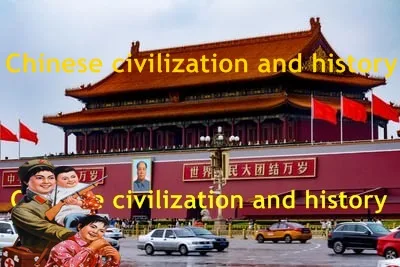Ancient Chinese Civilization and History:
Ancient Chinese civilization and History, The world may
not know much about the fact that the geographical conditions of China. like India, have greatly influenced the development of civilization and history.
China covers an area of 4 million square miles. with the Pacific Ocean to
its east, long mountain ranges, and vast deserts to its west and southwest, and
northwest.
 |
Ancient Chinese civilization and History |
Thus, for a long time, China was
naturally protected from foreign invaders from all sides. At the same time,
disengagement from the rest of the world helped the Chinese nation to
develop its own civilization. They did not influence the culture
of any other country. nor did they influence any other region.
Their world was their own vast country irrigated by the Hong Ho River. the Wei River and the Yangtze River. and other
small rivers, thus dividing China into three major parts.
The Hong Hue River was considered a
source of trouble for China because of its flooding. But the Yangtze River
(one of the longest rivers in the world) irrigated much of central China.
The area
of southern China is mountainous, where non-Chinese settled in large numbers. Chinese
civilization developed in certain areas of China. Which was irrigated by
rivers where the soil was fertile and where there was no shortage of food.
 |
| Ancient Chinese civilization and History |
China's population did not and does not
belong to any particular race. People of Chinese, Mongol, Manchurian
and Tibetan descent settled here and these different ethnic groups made
China their homeland.
It
is obscure as of now what he will do in the wake of leaving the post. There is
no mention of outsiders in ancient Chinese literature. but it does say
that China has always had settlements and people of different races.
 |
| Ancient Chinese civilization and History, |
But it is conceivable that from time to
time tribes settled in China from the southern hills and from Central Asia. first establishing villages and laying the foundations of a civilization that
in every way. even if it does not belong to the outside world. Was complete and
developed like the civilizations of Egypt, Babylon, and Sindh.
The development of Chinese
civilization can be divided into two periods. The first period is that
which we know only through Chinese stories and tales. and which has no
historical significance. The second period is the historical period in which
the governments of different families were established and Chinese
civilization reached its peak.
The period of myths and legends lasted
from three thousand years BC to about one and a half thousand years BC. But
there is no evidence from the history of the kings and families who ruled in the
mythical age. On the contrary, in these stories, special importance has been
given to the supernatural deeds of kings.
According to Confucius, in the
early part of this legendary period. the Chinese had developed so much that
they began to cultivate. They knew the use of gold, silver, copper, and lead.
They started using horses and other pets.
During this period, the Chinese became
acquainted not only with agriculture and minerals but also with
silkworms. They also learned about the use of chariots and horses in wars.
During the reign of the (Shin) dynasty (traditionally established in the 23rd
century BC). and an orderly government had been established in China.
The kings of the time entrusted the
kingdom to government ministers, including a chief minister and six other
ministers. These ministers were in charge of the departments of religion,
agriculture, public welfare, justice, education,
and communications. Law and order prevailed in the country and the law
was strictly enforced. There were five types of punishments for major crimes,
including bruises on the forehead, amputation of the nose, amputation of the
feet, stabbing, and manslaughter.
 |
| Ancient Chinese civilization and History |
The art of writing: -
In this ancient period, the Chinese also
invented pictorial writing. Through which they expressed their views.
Gradually the signs of the pictures took over and the number of these signs
reached fifty thousand. But familiarity with the five or six signs could lead
to reading and writing.
The Chinese style of writing was also
different from other types of writing in that the Chinese style had letters or
symbols written from top to bottom. While in other languages the letters were
written from right to left or from left to right. The ancient Chinese style of
writing is still used in China, with some modifications.
Ancient Chinese Historical Period: -
The weak kings, these provinces became
independent Chinese historical periods begin with the Shang dynasty.
Twenty-eight rulers of this family ruled in China from 1776 BC to 1122 BC, and
the feudal system was established in China at the same time.
China was a large country in terms of
its area. Therefore, the country was divided into many provinces to improve the
management of the empire. During the resident and many small and big states
came into existence in the country. But the sovereign governor or ruler
continued to recognize the king's supremacy and the central government
remained. The last rulers of this dynasty became tyrants and aristocrats. Fed
up with their tyranny, the ruler of the state (Chou) revolted and defeated the
king and established the Chou dynasty.
The Chou dynasty ruled for about 900
years. This is the most important period in the history of ancient China because
in this period the history of China has become very clear, which was
hitherto wrapped in stories and myths. During this period, philosophers
and religious leaders were born in China, who left an indelible imprint
of their teachings on Chinese civilization and added to the world's
knowledge and grace. Even today, the names (Laotse) and (Confucius) are as
important in world history as the names of Gautama Buddha and Zoroaster.
The Chou dynasty rulers made Hao
their capital in the Wei Valley and greatly expanded the empire. The rulers of
this family divided the country into 1773 new states and established
governorships and governorships over these states.
In internal affairs, these states were
independent, but they had to pay tribute to the central government and recognize
the supremacy of the chou dynasty emperor. But this situation was not
very satisfactory.
 |
| Ancient Chinese civilization and History, |
Such a large number of states could not
guarantee peace and order in the country. The central government had to be
weakened, with large states occupying smaller states. And a civil war was
raging in the country. Taking advantage of this weakness of the kings, the
tribes outside the country kept invading. These included the Tatar tribes in
particular.
Despite internal disturbances and external
attacks, the reign of the Chou dynasty's rulers remained in the country.
Without their approval, no new state could be established in the country and no
state could get the right to rule legally.
Religiously, the king was considered the
son of heaven, and, like the Pharaohs of Egypt, he was not only the ruler of the
country politically but also the most influential religiously. He performed
religious rites with great pomp so that there would be peace between the
heavens and the earth, the earth would be fertile, and the rains and the water
of the rivers would not reduce the productivity of the country.
 |
| Ancient Chinese civilization and History |
There have been kings in this family who
were very concerned about the welfare of their subjects and there are also
those who were very cruel. The independence of the provincial governments and
the civil war in the country did not bring peace to the Chou rulers, and the
influence of the Chou rulers began to wane in China.
By 771 BC, the nominal rule of the Chou
dynasty in western China lasted until the third century BC. Nawabs and feudal
lords of the states, rather than the Chou dynasty, spread the influence of Chinese
civilization throughout the country, so at a time when the central
government was weak and the feudal system was in place, Chinese civilization
underwent various stages of development. Remained
Thus, from the founding of the ancient
Chinese civilization to the present day, all stages of development have
continued. In the next step, we will discuss in detail the Chinese state and
society. We hope this article adds to your knowledge. Be sure to let us know
what you think. Thanks,
10 Facts About Africa - Did You Know?
The changing role of women




.jfif)

0 Comments